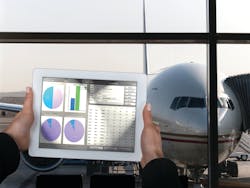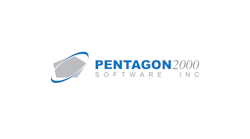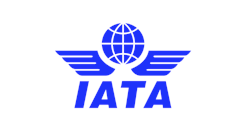The global MRO marketplace resembles an ecosystem; there are interconnected supply chains with a variety of repair stations to perform aircraft completions, interiors, modifications, conversions, heavy maintenance, line maintenance, paint, component repairs, teardown, part-out, and recycling. MROs are fundamental to the orderly operation of the aviation industry, and established in-house and independent third-party MRO organizations serve general aviation, commercial aviation, and defense sectors.
Historical role of IT
Information technology has a long history for providing critical support to MRO organizations over the years. Systems dating back to the days of computer punch cards provided automation for early adopters, and the era of green-screen terminals enabled logistics support and process control that still lives on today within many MRO shops. Stand-alone personal computers and spreadsheets enabled much-needed automation for small shops and departments of larger enterprises, but the age of client/server computing and relational database applications introduced a whole new set of benefits by providing integrated functionality and enterprise-class business applications.
Competitive landscape
MRO providers operate in a highly competitive environment, so in order to survive and thrive, there is a never-ending quest to improve efficiency and effectiveness of operations. Lowering materials and labor costs are always a top focus, and improving turn-around times can provide a competitive advantage over rivals. Information technology is playing an expanding role in today's most successful MRO organizations in order to boost performance and gain competitive advantage.
Ever-increasing requirements
In order to succeed in a fast-changing and competitive marketplace, today's leading MRO firms have developed operating strategies that include lean supply chains, continuous quality improvement, and aggressive turn-around times. In best case scenarios, careful planning can ensure optimal performance; however, unplanned work and nonroutine tasks can lead to chaos for hierarchical organizations that are not equipped to handle adversity.
Today's interconnected supply chains
As companies move to implement and refine lean business processes, inventories have been sharply reduced, and reliance on key suppliers has become more vital. Electronic tools that provide supply chain visibility allow MRO organizations to quickly locate and procure critical parts and components and prevent disruptions to tight schedules. MROs have become increasingly more dependent on the performance of their supply chains.
The empowered mobile work force
Just as inventories have been reduced in order to lower costs in pursuit of lean operations, a corresponding reduction in staff and overhead has also taken place within the industry. The days of monolithic purchasing departments and large dedicated planning staffs are gone and successful organizations are empowering their knowledge workers with applications and mobile devices to enable informed decision making and reduced cycle times.
New tools of the trade
With the recent proliferation of handheld mobile devices such as tablets and smart phones, a new generation of mobile applications has emerged that provides expanded capabilities for today's aviation professionals. Mobile devices connected by secure WiFi and cellular networks are now commonplace in most industries, and a variety of devices are available that range from large tablets to pocket-sized phones. Specialized accessories are available to integrate bar code scanning and to support rugged operations under harsh conditions.
It's all about the apps
While flashy high-tech mobile devices have become an enabler today, it is the applications themselves that are making the true impact on business operations. And while stand-alone mobile apps can provide some productivity improvements in much the same way as stand-alone spreadsheets have done in the past, apps that are tightly integrated with enterprise MRO platforms provide exponentially larger benefits for an organization. Leading MRO software providers are providing a broad range of apps that have robust functionality, are quick to deploy, and are fully integrated into its enterprise MRO application.
Customer service apps
It has been said that nothing happens until somebody sells something. While this may be an overstatement in many ways, there is no doubt that companies that have a relentless focus on serving their customers are well positioned for the future. Newly developed apps are now available to allow a customer service rep who is sitting in a customer's office or walking the floor of their shop to check for price and availability for a part or repair service, place an order, or obtain status on a pending delivery.
Supply chain apps
When a new part or component repair requirement becomes evident, today's supply chain specialists no longer need to retreat to the confines of their office cubicle and log in to a computer. Handheld mobile apps are available to check stock and reserve material for critical repairs. When items are not in stock, apps are available to search leading locator services such as ILS to identify sources and to place orders. As parts and components arrive at a repair station dock, apps are available to perform receiving and stocking bin updates. In order to ensure accurate and reliable inventory levels, apps are available to conduct inventory cycle counts on an perpetual or end-of-year basis. With these apps deployed across the MRO staff, for a mechanic under the wing or working in a machine shop, the supply chain has never been so close.
Labor collection and WIP accounting
For independent third-party MROs, in order to optimize profits, it is first necessary to optimize pricing. Prices that are set too high can lead to lost sales, and prices that are set too low can lead to lower margins. A key element required to optimize pricing is to fully understand one's true and actual costs. With the advent of electronic labor collection tools, mechanics can now record the time that they work on cards or tasks in order to maintain accurate WIP accounting.
In many environments, mechanics do not have quick and easy access to a computer terminal or a time clock, so labor times are entered after the fact and often estimated or applied to generic activities. Utilizing handheld mobile labor collection apps allows mechanics to quickly and easily scan bar code router or traveler operations during the performance of their work. Small and lightweight devices such as Apple's iPhone or iPod Touch with a bar code sleeve can run labor collection apps while a mechanic is under-wing or at a workbench enabling very precise labor collection by operation and task. These apps can dramatically improve the accuracy of an organization's labor tracking and WIP accounting, and further benefits can be obtained by using the resulting aggregate data collection to refine future plan-times for better estimating of tasks and operations.
Work order traveler - the MRO "killer app"
Work order travelers and routers are critical tools for both planning and execution of MRO tasks. Engineers and planners maintain a set of templates and documentation that fully define various work scopes to be performed. Robust MRO systems have capabilities to document templates containing bill of materials, cards and operations, prerequisite tasks, required skills and sign-offs, related technical publications, tooling, and other information that is critical to ensure conformance with quality standards and regulatory requirements.
While detailed templates can be utilized to generate printed work order routers and travelers, once the data is printed to paper, it can be cumbersome to manage and problematic to update. Computer workstations deployed across a shop can allow more dynamic access to information and allow update capability, but it is often not practical or affordable to deploy a network of workstations in every environment. A new generation of mobile apps provides an interactive electronic work order traveler that includes support for displaying and editing task cards listings, card details, requesting eligible parts, browsing technical publications and drawings, listing required tooling, capturing discrepancies, recording corrective actions, electronically signing off on tasks, and managing logbook entries. Capabilities for bar code input, labor collection, imaging, multimedia, quality management, regulatory support, and electronic sign-offs make the module a powerful addition for repair stations that need an interactive and compact mobile tool to support today’s demanding aviation maintenance operations.
Business value
In the end, mobile MRO apps are a means to an end. Combined with expert implementation in the form of setup and training, mobile apps can lead to underlying business benefits in the way of increased revenues, reduced costs, improved cycle times, and reduction of risks associated with adherence to compliance and quality mandates.
MRO organizations today manage an increasingly complex set of processes and procedures in order to comply with business requirements, quality system constraints, and regulatory mandates. Driving inefficiencies and costs out of the business can often mean the difference between maintaining business or losing it to competition or an outsourcing firm. Enterprise MRO software systems provide critical functionality to support operations. And in order to drive additional productivity improvements while maintaining the highest level of quality and process control, MROs are now equipping their staff with a new generation of mobile applications.
The operation of a repair station is a "team sport" where customer service, engineering, materials management, finance, planning, and other disciplines must be coordinated in concert. A range of mobile applications has become available that integrate seamlessly with enterprise applications. This new breed of apps support critical customer service requirements and allow today's MRO firms to maintain a competitive advantage over rivals within the industry.
Kirk Baugher is Senior VP of Business Development at Pentagon 2000 Software Inc. and has spent over 30 years in the enterprise IT and aviation industries. For more information about Pentagon 2000SQL and mobile apps, please visit: www.pentagon2000.com.






